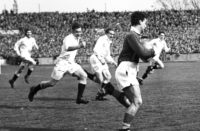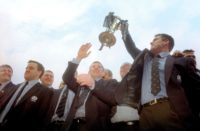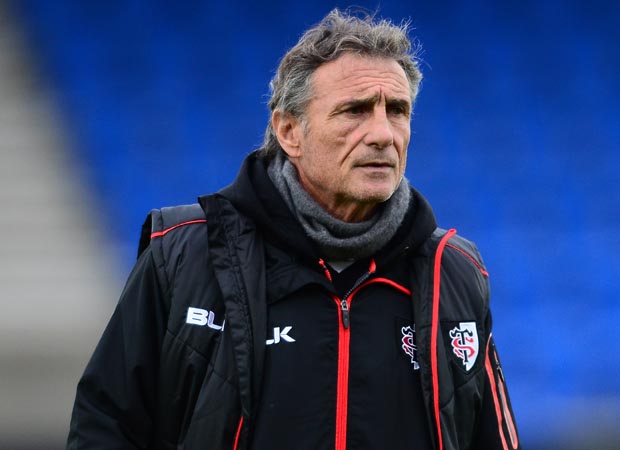 Last November Jim Greenwood, who died in 2010, was voted into the World Rugby Hall of Fame and next week his seminal coaching books Total Rugby and Think Rugby will be republished for the umpteenth time, full of enduring wisdom and expertise. This is the man whose coaching methods inspired Sir Clive Woodward and Sir Ian McGeechan, to name just two notables, and moulded scores of Loughborough graduates who became coaches at schools and clubs around the world.
Last November Jim Greenwood, who died in 2010, was voted into the World Rugby Hall of Fame and next week his seminal coaching books Total Rugby and Think Rugby will be republished for the umpteenth time, full of enduring wisdom and expertise. This is the man whose coaching methods inspired Sir Clive Woodward and Sir Ian McGeechan, to name just two notables, and moulded scores of Loughborough graduates who became coaches at schools and clubs around the world.
Yet Greenwood never coached a national team or indeed even came close which got me thinking about those of a similar ilk. Why do some get the call while others are rather conspicuously ignored despite a list of honours as long as your arm?
For a period in the Eighties, Ray Prosser presided over the most successful and feared club side in the world at Pontypool yet his name never warranted a mention when it came to the Wales job. Guy Noves at Toulouse is probably the most successful club coach in history yet, perversely, France have always looked the other way while Maurice Trapp's achievement in reigniting Auckland rugby and making them the main force in New Zealand 25 years ago went virtually unnoticed in his native England.
As for Carwyn James, where do you begin? A coach totally revered worldwide and a man who masterminded the Lions series victory in New Zealand in 1971 yet a coach considered beyond the pale by Wales.
With Greenwood it was very much a case of right man but wrong time and place, as one of his star former pupils at Loughborough Fran Cotton explains:
“Jim was without question the best coach I ever played under and it was unbelievable that he never got to coach a national team,” insists Cotton. “Essentially it was because England wouldn't pick a Scotsman and Scotland wouldn't pick one of their own living and working down in England. Ridiculous.
“I have never worked with anybody in rugby better at identifying a player's weaknesses and then rectifying them with specific training drill. He just instinctively saw and noted everything. So read what he has to say in these books, really concentrate and don't let your mind wander because you will become a better player or better coach.
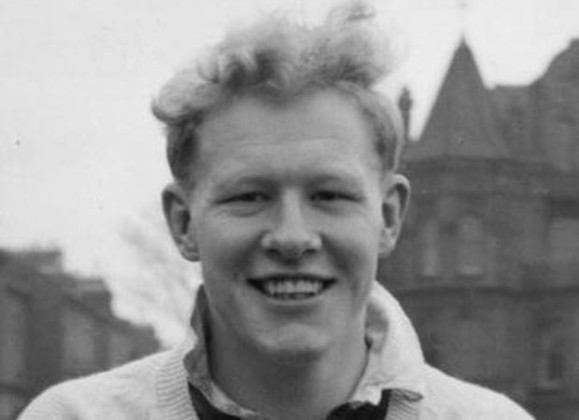
“Up against major senior teams we were often short of possession so he demanded that the game be played at tempo at all times, that everything be done with precision and at high speed. He was a perfectionist and hard taskmaster in that respect and you wouldn't leave the training field until a drill had been endlessly repeated to his satisfaction.
“He wasn't a shouter, though, who attempted to intimidate players, you always felt he was working with you. He spoke quietly with a faint lisp and appealed to your reason and logic.”
As for his books being launched next week, don't go looking for quick fixes and short cuts. A blagger's guide to rugby it ain't. Total Rugby is the degree course that provides the basis for all serious rugby students while Think Rugby, first published eight years later, is the Phd of Rugby for those wanting to stretch themselves to the very limits.
My guess is that Ray Prosser never read either book! His approach was much more prosaic. In the old amateur era there was a massive discrepancy between the fitness of many club sides and Prosser cannily noted that a lack of outstanding skill, nay brilliance, could often be countered by 15 storm troopers with the ability to play for 80 minutes. Supreme fitness was the essence of his game as a player and he brought that to Pontypool the moment he started coaching in 1969. For a good while it was hard to counter.
Achieving such fitness levels, however, demanded total belief in the man and his methods. Pooler's amateurs were expected to rise before dawn for private training runs or drag themselves down the gym after work 3-4 times a week as well as attend the ferocious fitness sessions at Pontypool Park.
Talent identification was the unspoken genius of Prosser, as a former player Lyndon Faulkner explains. Faulkner, a more than useful centre, has subsequently enjoyed a stellar business career in the USA where he was operations manager at Microsoft and the man responsible for bringing us Windows Vista, Microsoft Office and Xbox.
“With my business hat on now I can see that Pross was an incredible facilitator,” says Faulkner, the nephew of Pooler and Wales prop Charlie. “He had this vision of how he wanted his team to play which he formed during his British and Irish Lions tour of New Zealand in 1959 and when he became Pooler coach he executed.
“Pross was a brilliant recruiter of players – talent in the business sense – who fitted his template for success. His scouting system was second to none. There would be a couple of us from Newport and a Modern Languages graduate from Cambridge University, Eddie Butler, but the vast majority were virtually unknown players from local junior clubs he had spotted on a wet Tuesday night at a game or training.
“He trusted you to get on with the job and that was a massive lesson. When it came to floating a NASDAQ company in the States I had no expertise whatsoever in that field so I took a leaf right out of his book. Identify the talent you need, hire the right people, enthuse them with your vision and then let them perform.
“The biggest lesson of all from Pross was to be a winner in defeat which sounds glib but is important. Pooler didn't lose very often so when we did it was a major event and we bounced back with a vengeance. If the environment is right defeat or a business setback can be a big positive and result in an injection of energy. It makes you re-examine the process. Was it just a blip or did you actually get something fundamentally wrong? Was it your failing or, hand on heart, was the other guy better?”
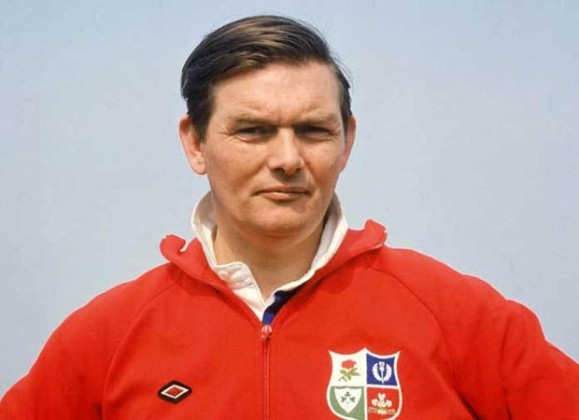
Prosser was so diametrically opposite to the romantic perception of the Welsh rugby coming out of the glorious Seventies – and so bored with rugby politics – that an appointment as national coach was always unlikely. More's the pity. Wales could have done with his realistic unsentimental approach as they got to grips with being just another decent Test side in the Eighties.
The situation with Noves has been complicated and aggravated by the fact that he also has always been unwilling to compromise his ideals and/or indulge in sports politics.
Clearly at some stage in the last 20 years Noves should have been the France coach and had that been the case I'd wager they wouldn't still be looking for their first World Cup title. He is a born winner and organiser, a curious mixture of structure, discipline and vision. He is the best – or certainly was the best – but of course low people in high places will often try to sideline a talent which highlights their own deficiencies.
Although Toulouse are currently rebuilding, they have essentially dominated French rugby for the last two decades which means among other things they have made a lot of enemies and jealousy has been rife. Toulouse's success can only be down to their superior budget and playing strength argue the detractors, ignorant of the fact that consistently winning on the biggest stage is an art form not a science. The money plays a part but can just as easily destroy a club and team.
The classic case came in 2007, which surely had to be Noves' time following the departure of Bernard Laporte, a genuine big hitter and the only modern day French coach who can be ranked with Noves. But no, the self-important French Federation decided to promote from within and give the job to Marc Lievremont, a young coach of modest accomplishments whose stock was higher than it should have been after his France U21s team won the Junior World Cup.
Lievremont's appointment was an inexcusable public slap in the face for Noves and, predictably, when the job next became vacant, after the 2011 World Cup, Noves decided to stay firmly in his tent and Philippe Saint-Andre appointed in his stead.
Trapp's story, as far as England were concerned, was a case of Maurice who? A good but not remarkable back-five
forward it was very much out of sight out of mind but what an extraordinary achievement to head off to New Zealand in the Seventies, play some club and provincial rugby and then climb up the coaching ladder of the strongest Union in the world's pre-eminent rugby nation. And then, having done so, to embark on an unprecedented run of success – three defeats in five seasons – with one of the greatest club or provincial teams ever gathered.
Mind you it was touch and go whether he got the job originally. Fate often plays a hand, good or bad, in these matters. After John Hart exited the Auckland job at the end of 1986 there were three contenders. Maurice Trapp, Auckland B coach Barrie Herring and a brash youngster who had been in charge of NZ Schools and Auckland University. Graham Henry by name.
The 27-man Auckland committee gathered at Eden Park and after debating the issue long and hard finally went to the vote with each man poling nine votes. So after another briefer debate they voted again. With the same result. Nine votes each. Finally the Auckland chairman Malcolm Dick warned that they would stay all night if necessary but a decisive vote was required. Trapp was duly returned although this time the exact voting figures don't seem to have been recorded. The job was his.
One of the problems is that these exceptional maverick coaches need to be in absolute charge, they have their vision and method which they must implement without reservation. They are not ‘corporate men' – the product of a system – they are their own creations and that is certainly where Carwyn James ran into troubled waters.
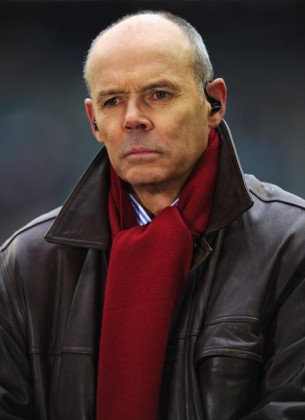
It was always going to be tough for James to break through and become the Wales coach. He was Welsh-speaking and very West Wales which will have aroused the suspicions of at least half the country while he was also extremely political – he stood for the Llanelli seat in 1970 as a Plaid Cymru candidate – which the WRU will have loathed. Additionally he was steadfastly against apartheid in South Africa which didn't sit well with the rugby establishment who at this time still happily embraced South Africa, warts and all. James didn't tick many of the non-rugby boxes.
But above all he was his own man as he outlined in a now famous letter to the WRU in 1974 when it seemed likely the Wales coaching job was up for offer. In short if was a full frontal attack on the power of the “Big Five” – the five selectors who picked the Wales team and ruled with a rod of iron. He started off by asking whether the “Big Five” would continue permanently in its present form and asked why they were appointed for three years not one before he went for the jugular and outlined how in effect all power should be devolved from them and distributed elsewhere: This was his five-point plan:
1: The national team coach, as in some other countries, should always be the chairman of selectors.
2: The chairman of selectors (ie coach) be allowed to choose two, three of even four advisors to help him. Preferably three.
3: That preferably these would be coaches now active with their clubs.
4: They would be chosen for their experiences as players (forwards/backs) as coaches and with reference to geography.
5: The national team coach and his advisors should seek the assistance of all club coaches in Wales and attend club coaching sessions from September. Wales from a rugby point of view, is sufficiently small to put these ideas into practice. Elsewhere they would be impractical.
Realising that he was asking for Turkeys to vote for Christmas James signed off: “My questions were rhetorical and I don't expect a reply.” Nor did he get one which is a great shame. Wales, without James at the helm, achieved many great things in the Seventies but they didn't beat the All Blacks when they should have done and they didn't have a system in place that saw them move smoothly into the less successful Eighties.
Had they acted on James' suggestions who knows what would have happened?


